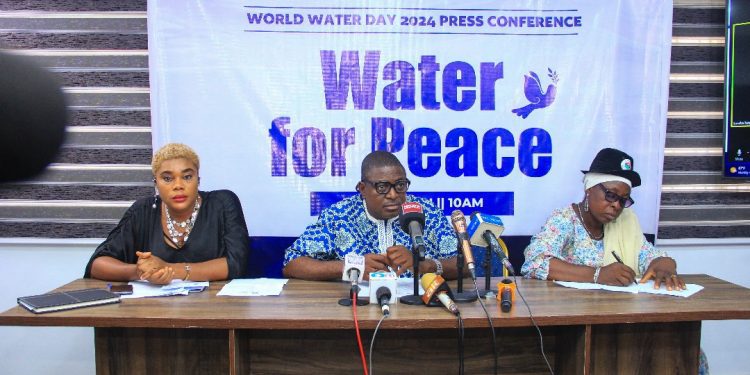Our Water Our Rights Coalition (OWORAC) has said privatization does not offer any good, but rather, it exacerbates inequality and causes social tension, thereby calling for a halt of every attempt by the Lagos State Government to privatize water in the state.
Identifying water as a fundamental human and an essential commodity for every household, the group noted that women and children suffer more to access water for their daily consumption, and the government must shun water privatization.
The group made this known in a press briefing to mark the 2024 World Water Day with the theme “Water for Peace.”
In her remarks, Comrade Gbemisola Ahmed, a representative from Amalgamated Union of Public Corporation, Civil Service Technical and Recreational Services Employees (AUPCTRE) Nigeria, described water privatisation as false solutions to the very real challenges that residents face.
Comrade Ahmed frowned at how the government seem to be embracing privatization despite the harms and pains that it inflicts on the populace.
“It is unacceptable that the costly water service, labor abuses, layoffs, and infrastructure neglect that often follow privatisation is allowed to spread. Yet, despite the overwhelming evidence of the harms that water privatisation inflict on communities the world over, it is still being embraced by those in power,” she added.
She thereafter advised that “governments should channel public funds into public service, not incentives that attract privateers. And, most importantly, they must ensure meaningful public participation from communities, civil society, and workers in the decisions that impact the people’s fundamental human right to water.”
For his part, Akinbode Oluwafemi, Executive Director, Corporate Accountability & Public Participation Africa (CAPPA), said the Lagos State Government has been bent on promoting profit-driven partnership models as purported solutions, despite global evidence documenting the failures of privatizing water supply and infrastructure.
Oluwafemi charged the Lagos State Government to “abandon any ongoing or future plans to privatise water services. As has been stated repeatedly and demonstrated globally, public-private partnerships offer no real solutions to water challenges.”
He also call for an increase in the budgetary allocation to revitalise the performance of the water sector, adding that, “this also includes refurbishing dilapidated infrastructure, upgrading existing waterworks and building new facilities to ensure widespread access to clean and safe drinking water.
“The Lagos Water Corporation must fulfill its responsibility of public water distribution across all areas of the state, not just economically viable neighbourhoods.”
The CAPPA ED recommended that the government should “strengthen regulatory oversight and implement proper reparation mechanisms in local communities affected by water injustices like contamination, scarcity, and inaccessibility. These mechanisms should include measures by state ministries of health to address the consequences of prolonged exposure to contaminated water, especially for women and girls.”
Oumar Ba, Syndicat Autonome des Travailleurs des Eaux from Senegal iterated the need for government to take actions, to ensure water is accessible to all.
Oumar said “Access to safe drinking water is an essential component of sustainable peace in the world. Everyone must work to preserve the quality of water resources and make them affordable and accessible to all communities, especially disadvantaged ones.”
Speaking on the screening of a video documentary about the plights of Iludun community, Zikorah Ibeh, Policy and Research Officer at CAPPA, shared that people are languishing without water and it is worst for women who need water.
“Water is a basic right that people should not beg for, for a state that prides itself as a megacity, we shouldn’t be having this challenge.
“Water privatization is not the solution to the problem of water in Lagos State,” she added.

